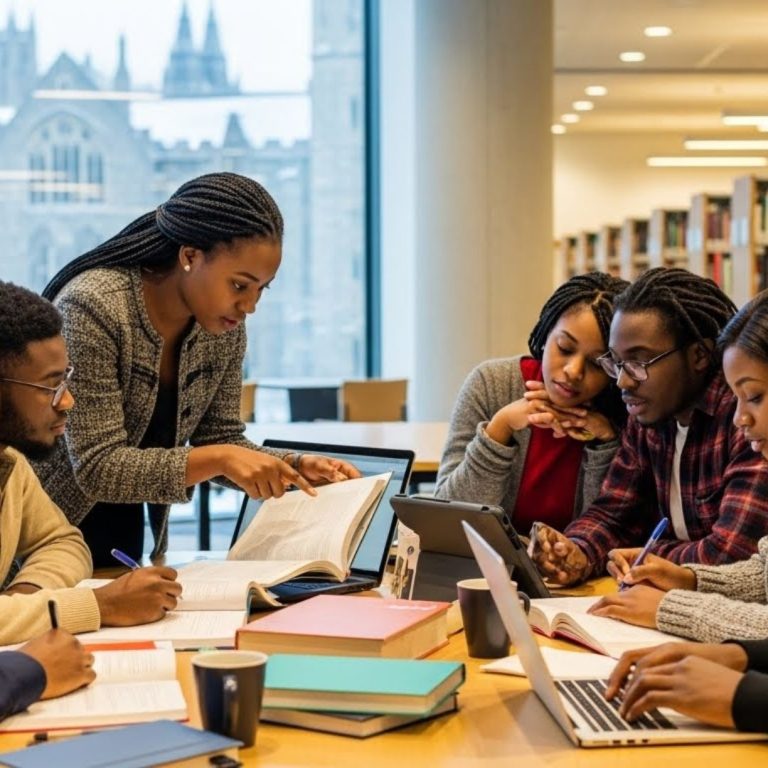Someone you know has left or is planning to leave. 1,000 Ways To Japa will speak to real people and explore the infinite number of reasons and paths they use to get to Japa.
When Dubem and his wife moved to the UK three years ago, they had no idea that the “for better or worse” part of their vow would become literal. He talks about how he and his partner were able to survive a long-distance marriage, health issues, relocation and financial stress.
When did you start considering japa as an option?
Japa has never been a strange concept to me; It’s a normal thing in my family. All my siblings left the country on the student route, and I left Nigeria using the Spousal Support Visa route.
I initially preferred Canada, but my wife got a job in the UK, so we had to move here instead. We made the decision because it felt like we were working hard and earning well in Nigeria but weren’t seeing any results. It just felt smarter to start over in a country with systems in place to make your life easier.
How’s that going?
So, we left the country with a ten-year plan. The idea was to return after ten years and set up our business. We planned to save up at least ₦100 million in capital.
We’ve been here for two years and are about 20% close to our savings goal. But recently, we had to buy a car. We paid in cash because we were still holding on to the Nigerian mentality that you are better off saving than relying on the credit system, which is a working credit system here. I’m only just now starting to accept that it’s a better way to make big purchases. We also had a baby.
Congratulations!
Thank you. That gives you an idea of why we’re still at 20%. I’m confident that we’ll go harder soon.
When we first moved, we lived in two different towns about seven hours’ drive away from each other, but that allowed us to focus on working as much as we could and earning a lot of money.
We used to travel to see each other once a month and spend a weekend together. Recently, though, things have changed, and we now live together. We now have other things taking our money, but we’re definitely still on track for that long-term goal.
How long did you guys live apart?
Almost a year. 11 months apart.
How did that affect your relationship?
We are not strangers to long-distance relationships. When I met my wife, I was schooling in the north, and she was transferred to work in Abuja. We decided to stay friends, but as time progressed, we started dating. When we started dating, I got a job in Abuja, and she got another job in Lagos. So doing long distance in the UK was no different.
You mentioned that you left on a spousal support visa. What did the process of getting the visa look like?
The UK’s National Health Services is one of the biggest employers of immigrants in the UK. My wife is a radiographer, so there were good job opportunities for her. We started the process before getting married, but COVID-19 forced us to deprioritise it.
The first thing we did was to register with the licensing board here. To do that, you need to present specific certificates showing that your education in Nigeria is equivalent to the UK’s requirement. This stage would also require you to present a statement of result. In our case, getting that document wasted our time because Nigerian universities can be somehow.
Once you can satisfy their requirements for that award, you get a license proving you have the right to practice in the UK. Once you pass that stage, you pay the registration fee and everything else.
The next thing is to apply for jobs that offer sponsorship. Those are the kinds of jobs that can give you the documents you need to apply for your visa. In our case, relocating with this visa took almost 10 months because we had issues with our passports. We both decided to renew our passports before leaving, and even though we paid for the fast track, it took us about two months to get that passport. We also had to prove that we were married.
We got our marriage certificate from a small court in my wife’s hometown, so we worried it wouldn’t be internationally acceptable. The court in question had no verifiable email or contact information, so a friend advised us to attach a PDF containing pictures of our wedding day, and that was what we did.
Another process that frustrated us was getting the tuberculosis test. You can only take the test in a UK-approved home centre. Getting a date for the test was hell; Something that should typically take weeks ended up lasting for about two months. We nearly lost the sponsorship from her employer because they thought she was unserious. Thankfully, everything worked out in the end.
Thank God!
Yeah. The final thing we needed was a police character certificate to prove that we were not criminally wanted in our country. Some parts of the application process for this certificate can be done online, but you have to go to the police station for your biometrics and other things. I remember my wife leaving the house around 8 am and getting back around 6 pm. That was because there was a long queue, and the process was unnecessarily stressful. She even had to pay a policeman about ₦2,000 to quicken the process.
God abeg. So, what was it like settling into the UK?
My wife’s employer had an apartment ready for her when she arrived in the UK, but there was a rule against me living there. She was living close to London while I had to move to Newcastle.
I was squatting with a friend whose apartment was big enough for two people. But getting a job wasn’t easy for me even though I was well educated and had a great portfolio.
After some rejections, I realised that they didn’t necessarily respect my Nigerian education. It wasn’t a question of competence because I wasn’t even getting interview invitations. Some Nigerians in the UK advised me to apply for factory or supermarket jobs, and that was what I did. I didn’t even last up to two weeks before I fainted at work–I had to do lots of heavy lifting while working from 6 am to 6 pm, and we weren’t allowed to sit at all during those 12 hours.
At first, it was just a fall, but I picked myself up immediately then I fell again, and I was asked to go home. I was stuck at the bus stop for hours, and it was freezing. I hadn’t made enough money to buy a proper winter jacket. The one I had was the second-hand jacket I bought from Yaba. I can’t remember the details, but it was at the bus stop I ultimately passed out.
I somehow ended up at my friend’s place, but I insisted on not going to the hospital (as I was later told). I was unconscious for three days, and when I regained consciousness, the first thing I did was put in my resignation.
So sorry about that experience. Did you get a better job after you quit?
I got a customer care representative offer about a week after that experience. It felt like a big downgrade because I was the head of marketing in a company when I lived in Nigeria. I was about to sign the offer when I got led by the Holy Spirit to check the company review. Thank God I did because it was about two stars out of ten. So, I just emailed HR to inform them that I won’t be moving forward with the role. I started applying again and eventually got a job by recommendation. The job would make me move to Kent, much closer to my wife’s location.
I took the job, and I’ve been working there ever since. One of the reasons why I’m still there is because I have empathetic employers. My wife had a complicated pregnancy, and we used to be in and out of the hospital.
At some point, the NHS stopped paying her because she had been sick for more than 60 days in nine months. But my employers were very understanding. I had to be in the hospital as much as my wife; we didn’t have anybody else to help, but my employer never complained about my absence. All they asked me to do was to take my laptop to the hospital, join a few meetings in the morning, get some tasks done, and that’s all. Then, they allowed me to take another one or two days off, and my income was never deducted based on all of this. They are great people.
Love that for you. Do you have any tips for couples that want to japa through the spousal support visa?
This is more of an advice than a tip. Be open to not being physically together for a while. Go where the money is, even if it means maintaining a long-distance relationship. Other couples might be lucky enough to get a well-paying job in the exact location, but they should keep an open mind.
Another thing you should do is work hard. You should both be working if you’re coming into the country as a couple. Nobody should sit around waiting for a dream job when other options exist to make money. But you should also make life easier for anybody with the sponsorship. For instance, I do the hospital runs for our baby while my wife focuses on not slacking at work because my job is more flexible.
What happens if she slacks at work?
If her employer isn’t satisfied with her performance, they can choose not to renew her visa. God forbid, but if that happens, she can apply for another job that comes with sponsorship before the visa expires. In the worst-case scenario that she doesn’t get a job, the UK government will give her about 60 or 80 days before declaring her an illegal immigrant.
Interesting. What’s one thing you love most about living in the UK?
It’s the constant access to power supply. As little as it may seem, that’s my favourite thing.
How happy are you with your life in the UK?
Oh, very happy. Things have fallen into place in the last three years. I love my job and my church.
I have a strong community here–We watch each other’s kids, celebrate, and help each other in many ways. Since my wife gave birth, we’ve not had her mom or mine come for omugwo, but the mothers in our church haven’t given us a reason to feel their absence. My wife gave birth to our baby through cesarean section, but these women were so helpful during the healing process. They would bring both of us food and help with the baby. That’s to give you an idea of the kind of community we have.
Want to to share your japa story? Please reach out to me here.




